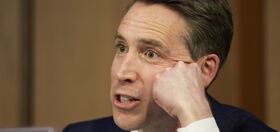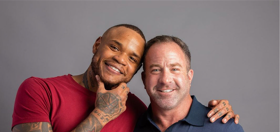
Michael Guest stepped into the spotlight again this week. The former Romanian ambassador, who resigned last year to protest the State Department’s gay inequality, held a press conference to highlight the Department’s documentation of anti-gay human rights abuses.
Despite the Department’s look at these abuses, that report, says Guest and his friends at the LGBT Foreign Policy Project, does nothing to address the stark, often violent reality of gay living abroad.
Our editor sat down with Guest yesterday to discuss the report, as well as the State Department’s queer inaction, how to approach anti-gay nations and why even a flawed democracy matters.
Check it out, after the jump.
Andrew Belonsky: So, let’s start this week’s press conference on the treatment of gay people abroad.
Michael Guest: Yes, well we talked about how the State Department’s report on LGBT rights has become more complete over time – over the past ten or twelve years.
AB: And what’s the significance of that – that the report has become more comprehensive?
MG: Well, it’s important to have an accurate understanding of what the picture of discrimination is against LGBT citizens overseas. It’s the starting point for action against legal discrimination, as well as a range of abuses that are being carried out. We need a clear picture of what’s happening in these countries in order to come up with an action plan.
AB: Obviously the State Department is well aware of abuses that are happening around the world, but do you think the State Department is really working to nullify abuses?
MG: First of all, without a human rights report, it’s not clear to me that the State Department or we as citizens would even know of the human rights abuses happening overseas. It was only in 1995 that LGBT issues were even put into the report. But, no, I don’t believe that the State Department is doing enough. More needs to be done. That starts with having a clear or more precise record – in other words, if you look at the report, some countries don’t mention LGBT issues at all. There needs to be greater clarity than what there is now and we’ll be taking that case to the State Department. Beyond the clarity, we want a record to show what the embassies are doing to counter the discrimination. We want a clear record of embassies expressing concern about reports of abuses – physical abuses against LGBT citizens. There’s a whole range of actions that need to take place and it’s not clear from the reports whether they are taking place.
AB: What’s the motivation for the State Department’s inaction? Or, rather, why are they not motivated to act?
MG: Well, the report is an onerous thing to compile, I know that, and very often embassies have twenty things they have to do in that day, so it’s easy for attention to the issue to slide. I think over time, since Jimmy Carter’s presidency, there has been a slide in our focus on human rights. Do I think it’s deliberate? No, not always. It may depend on the individuals, but I think in general there are just other priorities that have crept in and my organization believes this issue should be one of our highest priorities in keeping with what America stands for: freedom, equality, diversity and respect.
AB: What steps would you suggest – obviously the United States’ politics and economic system are intrinsically linked to anti-gay nations. Saudi Arabia comes to mind. Do you think that the State Department is worried about ruffling its allies’ feathers?
MG: I think the State Department doesn’t think about the issue actively: human rights abuses and particularly human rights abuses against the LGBT community. In the day-to-day world that embassies operate in – if you’re sitting in country that’s an ally in the war on terror, or you’re sitting in a country where we have developmental needs – certain projects take priority. That’s why we felt compelled to hold a press conference. These kinds of abuses are, in our view, quite serious. They need to be taken seriously by our government, which has pledged to represent the values and principles of this country. We understand that these issues don’t get treated in a void – every bilateral relationship is complex and involve many different factors, but you have to stand on principle. You have to have a consistent manner of raising concerns about the violation of individuals in countries, even countries that are our friends. You’ve got be able to speak clearly and consistently with them – and that’s really what friends should do with each other.
MG: There are international norms that have been negotiated over time in places like the United Nations that pertain to LGBT rights. I guess my response to any government that said, “That’s your culture” would to remind them of conventions that in all likelihood they have signed. Also, I would make clear that no matter what you think about homosexuality, there’s still an obligation to ensure that they are protected against being killed and they shouldn’t be abused because they’re homosexual. There are norms that should be followed irrespective of one country’s background: norms that are international. And that’s what human rights are all about.
AB: Back to America, with regard to your resignation – what’s your view of American democracy? Obviously democracy is one man, one vote, but take that a little further and think of liberal democracy, all men are created equal. Has liberal democracy really been a success in the United States?
MG: Well, let me look at it in a slightly different way. I’ve spent 26 years of my life – well, more than that – studying foreign policy and then 26 years being an active diplomat posted to a number of countries. I’ve seen how democracy is not perfect in any country, just like individuals are not perfect. Everybody has their own beauty spots and flaws, their strengths and weaknesses. And the same is true about democracies. I think America has a more vibrant democracy than so many countries that I have seen, but it’s not perfect. What I love about American democracy – and why I’m involved in this project – is that when Americans see something unjust, they get involved. Not everybody, but you have the capacity to get involved. There are a lot of organizations in civil society that exist to call attention to issues.
I love the fact that in this country that you can debate and push for change and that isn’t the case in a lot of countries around the world. Yes, we have flaws in our system. In fact, I was commenting to someone that there is a certain amount of irony in the fact that the State Department puts out this report on human rights violations overseas every year, but no one really does an assessment of our own democracy and our own human rights failings.
AB: Definitely.
MG:There’s also irony in the fact that while the State Department’s putting out these reports, it is practicing discriminatory policies in its work place against LGBT employees, which is why I left. But, having left and having then found an organization and raise my voice on Capitol Hill – the issue has now been raised to the Secretary of State by a member of Congress and the Secretary has now responded with one small change in favor of partners of gay and lesbian foreign service employees: to allow the partners to attend the security seminar, but that’s a baby step. It does, however, show that you can have an impact by getting involved.
I think we’ve lost a lot of opportunities over the past seven years to use America’s influence for positive good in areas like this: human rights abuse issues. We want to see that attention to principle on the basis of what this country has always stood for. It’s important that the government start standing on principle.


















Charley
Great to read about an American who really gets what it means to be an American.
chandler in lasvegas
A man of substance who eerily looks like he could be Rex Reed’s brother.
alan brickman
Isn’t his boyfriend still in the closet?? I mean how respectable is that?…what type of message is “he” sending…?
M Shane
Mr. Guest makes an opaque referrance to it, but the U.S. has an overabundant history of supporting and bringing about Dictatorships as replacements for democracies all over the world. We can’t really expect them to differentiate between gay people and the thousands of other people who they brutal ize torture and “disappear”. In Indonnesia, when we had Sukarno replaced by Suharto, whi could tell if people were gay when they murdered over a million people in a matter of a few weeks(the waterways were so clogged with bodies that they were impassable.
It has become a matter of fact democracies are not too fond of being exploited economically by U. S countries, so to make sure that capitalism rules since 1950 we have made sure that dictatorships always make sure of that.
Digger
Thanks for publishing this interview with Ambassador Guest, a man who I, like most other lesbian and gay Foreign Service Officers, have a great deal of respect for. I have quoted your interview here: http://lifeafterjerusalem.blogspot.com/2008/03/ambassador-guest-talks-about-human.html